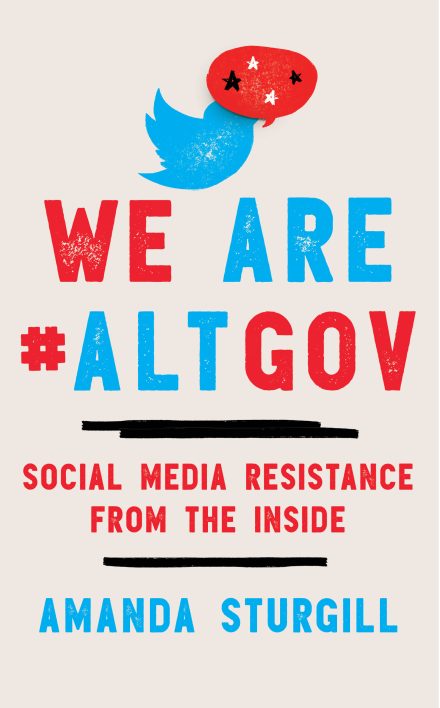The associate professor of journalism wrote “We Are #ALTGOV: Social Media Resistance from the Inside,” highlighting how and why the #AltGov Twitter movement challenged official governmental statements to inform the American public.
The risk to her participants was real, so she had to take extra precautions, Amanda Sturgill explained.
 As she conducted interviews to support her recently published book, “We Are #ALTGOV: Social Media Resistance from the Inside,” the associate professor of journalism took steps to preserve her sources’ anonymity. The interviewees included brave civil servants participating in the #AltGov Twitter movement, a grassroots initiative featuring government employees and others offering insight and commentary that challenged the government’s official statements. It was a significant social media trend – at one point nearly two million people followed AltGov accounts.
As she conducted interviews to support her recently published book, “We Are #ALTGOV: Social Media Resistance from the Inside,” the associate professor of journalism took steps to preserve her sources’ anonymity. The interviewees included brave civil servants participating in the #AltGov Twitter movement, a grassroots initiative featuring government employees and others offering insight and commentary that challenged the government’s official statements. It was a significant social media trend – at one point nearly two million people followed AltGov accounts.
“The account holders who worked for the government were at some risk just for doing what they did – sharing information that, while not classified, wasn’t well-known to help the public understand some changes under the Trump administration. So, they stayed anonymous online and with me,” Sturgill said. “I had to be very cautious to guard their identities.”
Sturgill said she did the interviews through Twitter direct messages, along with emails, phone calls and messages over secure platforms like Wire and Signal. She conducted extensive interviews with #AltGov followers, too, including meeting two of them in person when she visited their city for an academic conference.
Sturgill said the #AltGov movement immediately engaged her because it intersected with many of her interests. A journalism and new media instructor for 25 years, she has extensive experience researching new communication technologies and news, as well as studying organizational communication. Additionally, she has investigated how ideological groups use online communication technologies.
“The #AltGov social movement caught my eye on Twitter from the beginning, when those initial tweets from the National Park Service and BadlandsNPS accounts seemed to spark something that grew really, really fast,” she said. “Over just a few days, accounts purporting to be employees from many different parts of the administrative branch sprang up and immediately attracted tens and even hundreds of thousands of followers. It was fascinating.”
In fall 2017, Sturgill worked with Andrew Scott ’18, then a media analytics major, to investigate the movement for an undergraduate research project. Together, the student and faculty member compared the followings and contents of official and Alt government accounts regarding environmental subjects. The results were award-winning, with Scott earning a first-place student award at the Broadcast Education Association’s research symposium on analytics, organized by Elon’s own Don Grady, a longtime School of Communications faculty member and former associate dean.

Scott’s symposium presentation, like that of his peers in Las Vegas, was recorded. Sturgill said she shared a link to the video on Twitter on a whim, tagging @RogueEPAStaff, which was one of the accounts Scott had studied. The account holder wrote back and inquired if Scott or Sturgill would like to interview some of the #AltGov account holders. Since Scott was approaching graduation, Sturgill took over the project. She spent much of the past four years compiling sources and content from interviews with a variety of accounts, matching that with analysis of their Twitter feeds.
The book, which was released in August, is Sturgill’s second book with publisher Rowman & Littlefield, which also published “Detecting Deception: Tools to Fight Fake News” in August 2020. Sturgill credits her publisher for creating imaginative book covers that tie into her topics. “For ‘We Are #AltGov,’ I love how the cover conveys the medium with the Twitter bird, the style with the speech symbols and the rogue nature of the whole enterprise with the distressed look of the typography,” she said.
Now at the end of a nearly five-year journey to tell this story, Sturgill can see how the final version compares to her original idea. “Although it started as a way to tell the AltGov story, I eventually came to see it as a story about America. It wasn’t just them, but what they did for, and with, their fellow citizens,” she said.
Sturgill delves deeper into this subject in a recent blog post titled “What I learned about America from writing ‘We Are #ALTGOV.’”
The author called it gratifying to see her book in print, noting the impact the movement and its account holders had during a tumultuous political time in the United States – a time period the country really hasn’t left.
“The things that the Alts and their followers accomplished are truly jaw-dropping in some cases, and I am glad people will remember it in something more permanent than a Tweet,” Sturgill said.


